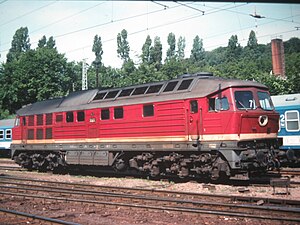DR Class 132

DR 242 in Stralsund (June 1993)
|
|||||||||||||||||
|
|||||||||||||||||
|
|||||||||||||||||
|
|||||||||||||||||
|
|||||||||||||||||
| Type and origin | |
|---|---|
| Power type | Diesel-electric |
| Builder | October Revolution Locomotive Works |
| Serial number |
DR 130 001–080, 101, 102 |
| Build date | 1973-1982 |
| Total produced | DR 130.0: 80 DR 130.1: 2 DR 131: 79 DR 132: 709 DBAG 233: ? DBAG 234: ? DBAG 241: 10 DR 142: 6 |
| Specifications | |
|---|---|
| AAR wheel arr. | Co-Co |
| Gauge | 1,435 mm (4 ft 8 1⁄2 in) |
| Wheel diameter | 1,050 mm (41.34 in) |
| Length |
DR Class 130.001 to 080 (DB Class 230), 131 (DB Class 231):20.620 m (67 ft 7.8 in) |
| Loco weight |
DR 130,131 : 116 t (114 long tons; 128 short tons) |
| Fuel type | Diesel |
| Prime mover | Kolomna Locomotive Works 5D49 (16TschN26/26), 3000 HP |
| Performance figures | |
|---|---|
| Maximum speed |
DR 130, DBAG 234: 140 km/h (87 mph) |
| Power output |
DR 130, 131, 132, 234: 2,208 kW (2,961 hp) |
| Tractive effort | Starting (?) |
| Career | |
|---|---|
| Operators |
Originally Deutsche Reichsbahn (East Germany) inherited by Deutsche Bahn AG Also post DBAG use - various private operators |
| Nicknames | Ludmilla |
| Delivered | 1973-1982 to DR |
DR 130 001–080, 101, 102
DR 131 001–076, 158, 160, 164
DR 132 001–709
DR Class 130.001 to 080 (DB Class 230), 131 (DB Class 231):20.620 m (67 ft 7.8 in)
DR 130,131 : 116 t (114 long tons; 128 short tons)
DR 132, DBAG 233,234,241 : 120 t (120 long tons; 130 short tons)
DR 130, DBAG 234: 140 km/h (87 mph)
DR 131, DBAG 241: 100 km/h (62 mph)
DR 130, 131, 132, 234: 2,208 kW (2,961 hp)
DBAG 233: 2,206 kW (2,958 hp)
The DR 130 family of locomotives comprises the DR Class 130 (DBAG Class 230), DR Class 131 (DBAG Class 231), DR Class 132 (DBAG Class 232 as well as Classes 233, 234 and 241 produced through modifications) and DR Class 142 (DBAG Class 242).
They were produced in the Soviet Union in Luhansk, Ukraine from the 1970s onwards, and were imported into the GDR. After the reunification of Germany the Deutsche Bahn (DBAG) inherited them and continue to make use of them mainly as heavy freight locomotives.
Nicknamed Ludmilla, over 700 units were produced between 1970 and 1982. Two of these machines are classed as works vehicles with the designation Class 754.
During the 1960s the East German government decided to focus on diesel traction. Due to RGW guidelines the GDR had to stop their production of diesel-hydraulic locomotives. Instead GDR imported heavy-duty engines from the USSR, starting with the a version of the M62 known as the V200 (later Class 120; Class 220 after reunification) for freight trains.
Lacking electric train supply and with a top speed of 100 km/h (62 mph) the Class 120s were unsuitable for passenger work; to meet these demands the Luhansk locomotive works introduced the DR Class 130 in 1970 capable of a top speed of 140 km/h (87 mph). Unfortunately the soviet industry could not provide an electric heating feature, therefore the engines were restricted to freight trains for which their gearing was too high. Subsequently the 'DR Class 131 with a reduced top speed of 100 km/h (62 mph) (and thus a higher tractive force) was delivered for freight services.
...
Wikipedia
